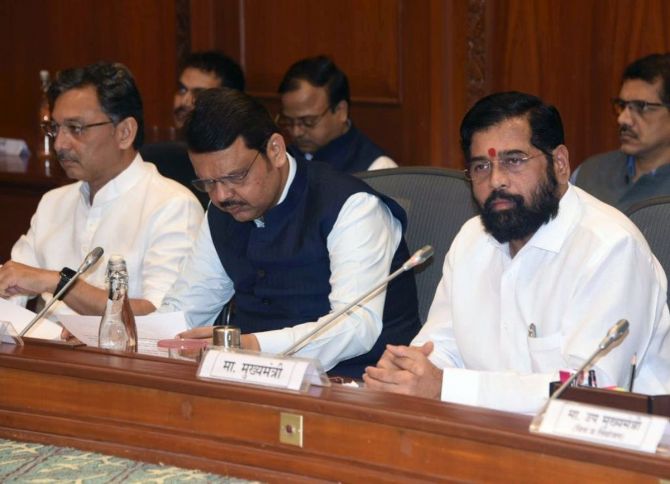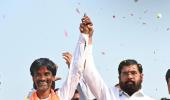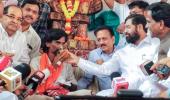The Maharashtra legislature on Tuesday unanimously passed a bill providing 10 per cent reservation for the Maratha community in education and government jobs.

Chief Minister Eknath Shinde tabled the Maharashtra State Socially and Educationally Backward Bill 2024 in the legislative assembly during the day-long special session of the legislature on Maratha quota.
The bill, which was passed unanimously by the house, stated that Marathas comprise 28 per cent of the total population of Maharashtra.
A substantial number of castes and groups are already placed in the reserved category, getting about 52 per cent of reservations altogether. It would be completely inequitable to place the Maratha community in the Other Backward Class (OBC) category, it said.
The backwardness of the Maratha class is distinct and different from backward classes and, more particularly, OBC in the sense that it is more pervasive in terms of its coverage, it differs in its penetration and further regressive in character, the bill said.
The Maratha quota bill also proposed that once the reservation comes into effect, its review could be taken after 10 years.
Out of the 52 per cent reservation currently existing in the state, the Scheduled Castes are eligible for 13 per cent, Scheduled Tribes 7 per cent, OBCs 19 per cent, Special Backward Classes 2 per cent, Vimukta Jati 3 per cent, Nomadic Tribe (B) 2.5 per cent, Nomadic Tribe (C) Dhangar 3.5 per cent and Nomadic Tribe (D) Vanjari 2 per cent.
After tabling the bill in the house, CM Shinde said as many as 22 states in the country have crossed the 50 per cent reservation mark.
"For instance, Tamil Nadu state has 69 per cent, Haryana 67 per cent, Rajasthan 64 per cent, Bihar 69 per cent, Gujarat 59 per cent and West Bengal 55 per cent. I can mention other states as well. The purpose of the session is to help the (Maratha) community," he said.
"We want to give reservation to the Maratha community without touching the existing quota of the OBCs in the state. The Marathas have been struggling for the last 40 years to get reservation benefits," the CM said.
The bill was later also passed unanimously in the state legislative council.
It will now be sent to Governor Ramesh Bais for his assent.
Maratha quota activist Manoj Jarange, who is sitting on a hunger strike since February 10, had demanded that a special session of the legislature be called over the issue.
The government recently issued a draft notification which said if a Maratha person has documentary proof to show that he or she belongs to the agrarian Kunbi community, the person's 'sage soyre' or blood relatives too would get Kunbi caste certificates.
The Kunbi community falls in the OBC category, and Jarange has been demanding that Kunbi certificates be issued to all Marathas.
Maharashtra cabinet minister Chhagan Bhujbal has been opposing the "backdoor entry" of Marathas into the OBC quota, but is in favour of a separate reservation for the community.
Notably, the Maharashtra State Backward Class Commission on Friday submitted a report on its survey on the social, economic, and educational backwardness of the Maratha community.
One of the key findings in the bill tabled by CM Shinde underscores that the population of the Maratha community in the state is 28 per cent.
Out of the total Maratha families that are below poverty line, 21.22 per cent hold the yellow ration cards. It is higher than the state's average of 17.4 per cent.
The state government's survey undertaken between January and February this year also found that 84 per cent of the Maratha community families do not fall under the progressed category, hence they are eligible for reservation as per the Indra Sawhney case, as per the bill.
Out of total farmers' suicides in Maharashtra, 94 per cent are from Maratha families, the bill noted.
The bill highlighted that in 1902, Rajarshi Shahu Maharaj gave reservation benefits to the Maratha community in the erstwhile Kolhapur princely state while the then Mumbai state also recognised the Maratha community as one of the backward classes in its report.
A resolution of the Mumbai state on April 23, 1942, mentioned the Maratha community as one of the medium and backward classes.
In 2017, the state government asked the Maharashtra State Backward Class Commission headed by retired Justice M G Gaikwad to undertake data collection and later enacted a law to provide reservation to Marathas.
Although it was challenged in the Bombay high court, the law sailed through it, but the Supreme Court struck it down.
A fresh commission under Justice (retd) Sunil Shukre was recently set up, which undertook the survey of 1,58,20,264 families in the state and collected data with the help of 1,96,259 enumerators.
The report found that educational indicators illustrate the Maratha community's lower education in terms of completing secondary education and achieving graduate and post-graduate degrees and professional courses. It is mentioned as the highest barrier to education. Insufficient education often invites poverty, as per the bill.
The summary tables of employment, such as in schools and government and semi-government departments, also revealed that the Maratha class is inadequately represented in all sectors and, therefore, deserves special protection via reservation in these services, it said.
The Maratha community's economic fortune is marked by dwindling returns from agriculture, fragmentation of land holdings, loss of traditional dignity associated with agriculture, and lack of attention to the educational training of youth, among others, it added.










